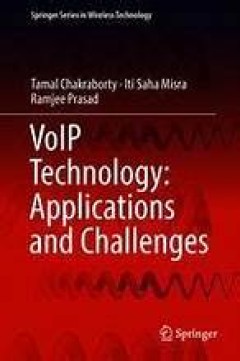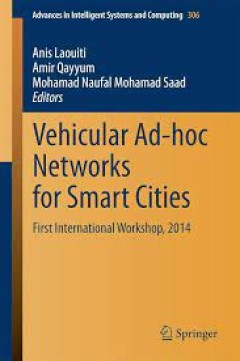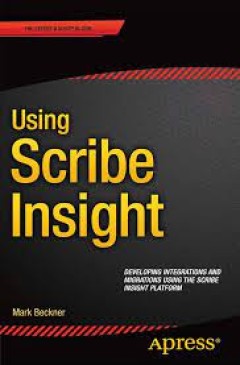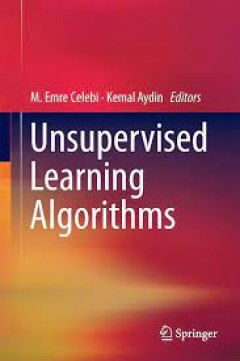Filter by

Context-Aware Communication and Computing: Applications for Smart Environment
This book introduces context-aware computing, providing definitions, categories, characteristics, and context awareness itself and discussing its applications with a particular focus on smart learning environments. It also examines the elements of a context-aware system, including acquisition, modelling, reasoning, and distribution of context. It also reviews applications of context-aware compu…
- Edition
- 1
- ISBN/ISSN
- 978-3-319-59035-6
- Collation
- Komputer
- Series Title
- -
- Call Number
- 004

VoIP Technology: Applications and Challenges
This book offers an accessible introduction and practical guide to Voice over Internet Protocol (VoIP) technology, providing readers with the know-how to solve the problems encountered in applying VoIP technology across all types of network. It incorporates the latest research findings and brings readers up to date with the challenges that are faced by researchers developing novel applications …
- Edition
- 1
- ISBN/ISSN
- 978-3-319-95594-0
- Collation
- Komputer
- Series Title
- -
- Call Number
- 004

Cyber Security: The Lifeline of Information and Communication Technology
This book discusses a broad range of cyber security issues, addressing global concerns regarding cyber security in the modern era. The growth of Information and Communication Technology (ICT) and the prevalence of mobile devices make cyber security a highly topical and relevant issue. The transition from 4G to 5G mobile communication, while bringing convenience, also means cyber threats are gro…
- Edition
- 1
- ISBN/ISSN
- 978-3-030-31703-4
- Collation
- Komputer
- Series Title
- -
- Call Number
- 004

5G and Beyond Wireless Systems
This book presents the fundamental concepts, recent advancements, and opportunities for future research in various key enabling technologies in next-generation wireless communications. The book serves as a comprehensive source of information in all areas of wireless communications with a particular emphasis on physical (PHY) layer techniques related to 5G wireless systems and beyond. In particu…
- Edition
- 1
- ISBN/ISSN
- 978-981-15-6390-4
- Collation
- Computer
- Series Title
- -
- Call Number
- 004

Information Theory, Mathematical Optimization, and Their Crossroads in 6G Sys…
This book provides a broad understanding of the fundamental tools and methods from information theory and mathematical programming, as well as specific applications in 6G and beyond system designs. The contents focus on not only both theories but also their intersection in 6G. Motivations are from the multitude of new developments which will arise once 6G systems integrate new communication net…
- Edition
- 1
- ISBN/ISSN
- 978-981-19-2016-5
- Collation
- Engineering
- Series Title
- -
- Call Number
- 620

Vehicular ad hoc Networks Standards, Solutions, and Research
This book presents vehicular ad-hoc networks (VANETs) from the their onset, gradually going into technical details, providing a clear understanding of both theoretical foundations and more practical investigation. The editors gathered top-ranking authors to provide comprehensiveness and timely content; the invited authors were carefully selected from a list of who’s who in the respective fiel…
- Edition
- -
- ISBN/ISSN
- 978-3-319-15497-8
- Collation
- -
- Series Title
- -
- Call Number
- -

Vehicular Ad-hoc Networks for Smart Cities First International Workshop, 2014
Vehicular communication is a key technology in intelligent transportation systems. For many years now, the academic and industrial research communities have been investigating these communications in order to improve efficiency and safety of future transportation. Vehicular networking offers a wide variety of applications, including safety applications as well as infotainment applications. T…
- Edition
- -
- ISBN/ISSN
- 978-981-287-158-9
- Collation
- -
- Series Title
- -
- Call Number
- -

Using Scribe Insight Developing Integrations and Migrations using the Scribe…
Understand how to utilize the workbench, console, adapters, publisher, and other components in Scribe to ensure you have a rapid development toolkit that will drastically reduce your workload and timeline. In Using Scribe Insight, you’ll learn to build your integrations and migrations with the minimal amount of effort, what shortcuts can be taken to simplify and reduce your labor, and what te…
- Edition
- -
- ISBN/ISSN
- 978-1-4842-1624-8
- Collation
- -
- Series Title
- -
- Call Number
- -

Unsupervised Learning Algorithms
This book summarizes the state-of-the-art in unsupervised learning. The contributors discuss how with the proliferation of massive amounts of unlabeled data, unsupervised learning algorithms, which can automatically discover interesting and useful patterns in such data, have gained popularity among researchers and practitioners. The authors outline how these algorithms have found numerous appli…
- Edition
- -
- ISBN/ISSN
- 978-3-319-24211-8
- Collation
- -
- Series Title
- -
- Call Number
- -

Hyper-lattice Algebraic Model for Data Warehousing
This book presents Hyper-lattice, a new algebraic model for partially ordered sets, and an alternative to lattice. The authors analyze some of the shortcomings of conventional lattice structure and propose a novel algebraic structure in the form of Hyper-lattice to overcome problems with lattice. They establish how Hyper-lattice supports dynamic insertion of elements in a partial order set with…
- Edition
- -
- ISBN/ISSN
- 978-3-319-28042-4
- Collation
- X, 63
- Series Title
- -
- Call Number
- 621 SEN h
 Computer Science, Information & General Works
Computer Science, Information & General Works  Philosophy & Psychology
Philosophy & Psychology  Religion
Religion  Social Sciences
Social Sciences  Language
Language  Pure Science
Pure Science  Applied Sciences
Applied Sciences  Art & Recreation
Art & Recreation  Literature
Literature  History & Geography
History & Geography